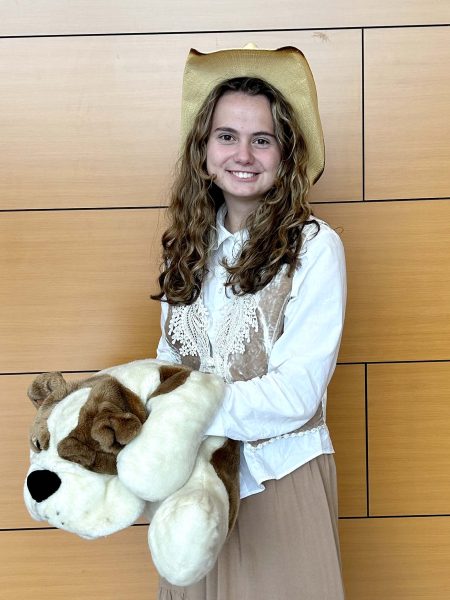Finding balance: Student and teacher perspectives on AP culture at EHS
AP Psychology and AP World History teacher Heidi Mathers recalls seeing a student falling asleep during class because of his AP workload. “I tried to talk to his mom about it and she was like, ‘Well, he has to take these AP classes,’” she said.
November 23, 2022
Out of the 2,730 students enrolled at Edina High School, 1,447 take at least one AP class. EHS has a reputation of being a highly competitive school, which can partly be attributed to the culture surrounding AP classes. Though the courses can be beneficial to students, offering them the chance to earn college credits by completing college-level coursework, they can also take a toll on mental health.
Due to EHS’ academic rigor, many students feel pressure from fellow classmates to take AP classes. “Ever since ninth grade, I’ve always been like, ‘Oh my gosh, I’m not taking enough AP classes,’ but then I look at other school districts, and they only offer enough AP classes for people to take like five, whereas Edina has almost all of them,” senior Ashlee Kalair said. Neighboring schools, such as Richfield High School and Washburn High School, offer 11 and 7 AP courses respectively, compared to EHS’ 25.
For junior Katie Hagen, the stigma around AP classes was subtle. “I think it’s kind of unspoken in that you may not feel immediately or directly judged if you do not take an AP class, but I think that pressure is definitely a factor in February when you’re picking out your classes and talking to other people, and they’re like, ‘What classes are you guys taking?’” she said.
Students believe EHS’ competitive environment creates pressure to take AP classes and excel in them. “Even if there are no actual words exchanged like ‘Oh, you don’t take APs,’ there’s still a stigma around it,” said junior Josie Bailey.
“I feel like every test, someone will be like, ‘What did you get? What did you get?’” Kalair said. “And if someone got a B, they’ll say, ‘That was so bad. I got a B.’ There’s a lot of competition and it just doesn’t make me feel very good.”
The stress of taking AP classes often takes a toll on students’ well-being. AP Psychology and AP World History teacher Heidi Mathers recalls seeing a student falling asleep during class because of his AP workload. “I tried to talk to his mom about it and she was like, ‘Well, he has to take these AP classes,’” she said. “I mean, you’ve got to have some balance…I think there’s a place for standard classes and for AP, and you should do what you think will lead to a balanced life.”
Students and teachers alike agree that balance is necessary when choosing AP classes. “I feel like I can get pretty much any kid to be able to understand the material, but it’s keeping up with the workload, which I think is sometimes really challenging. Kids will come in, they’ll be like ‘Do you think I should take AP?’ [My response is] what does your [life] outside of school look like?” said Mary Stucynski, who teaches AP US History.
Some students found that AP classes didn’t fit their learning styles and preferred to stick to a regular course load. “I took AP World History for two weeks and it was just too fast-paced for me, so I didn’t enjoy it, and I went to normal History, and that was a lot better. But I haven’t taken any APs yet because I’d rather do good and feel comfortable in what I’m learning than feel like I’m not doing as good as I could be,” Bailey said.
Junior Jackson Doe also elected not to take APs this year. Both Doe and Bailey have seen improvements in their grades and feel they made the right decision. “[My stress levels are] very low, which is another reason why I didn’t like my APs, I had lots of homework. So I have a lot more free time, a lot more time to do what I want instead of having to take away a majority of my free time to do homework,” he said.
But Isaiah Sweeney, who has taken 12 AP classes at the high school, finds AP coursework to be more manageable than regular coursework. “[I’m not overwhelmed] whatsoever. I find that I have less homework in AP classes than [non-AP classes], I maybe have an hour a day max… The reason I find that there’s less homework is that generally it’s a lot more concentrated in what you need to get done, versus just general curriculum in regular classes,” he said.
The AP classes offered by the high school aren’t the only option for students looking for accelerated coursework. Senior John Vaccaro was interested in taking AP Art History, but found it wasn’t offered by EHS. He chose to self-study for the exam without taking the course. “I created these flashcards because in order to complete [the test] you have to memorize like 250 different works of art. It seemed intimidating at the beginning and it was a lot of work I had to put in, but it was really rewarding for me at the end,” he said.
But he would have preferred to take the class offered by the high school. “I would always love to see Edina High School expanding its class opportunities in terms of AP classes. I think Edina does offer the vast majority of them, but something like art history would be a class that, if we offered it, I think a lot of kids would be interested in taking as an elective class.”
Many students agree that peers should take AP classes on subjects they’re passionate about rather than being motivated by external influences like peer pressure. “Do the AP classes that you’re interested in or genuinely want to focus in on, don’t just take them because everybody else is taking them,” Hagen said.
“AP classes are a good way to challenge yourself and get a taste of college workload, but you shouldn’t be taking six as a 14-year-old,” Kalair said.
Stucynski reminds students that teachers are there to support them when they need help. “If you’re feeling overwhelmed and stressed, don’t struggle silently about it,” she said.




